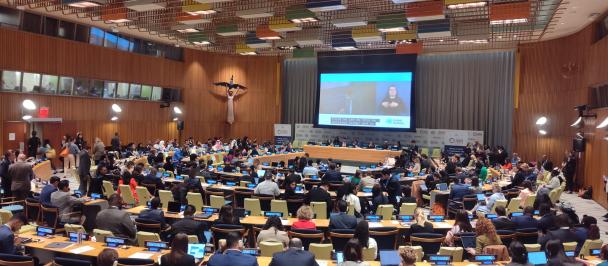Speech by Maria Suokko, UNDP Resident Representative Digital Solutions for protection against Gender Based Violence in Public and Online spaces.
November 30, 2022
Dear Donjeta, Blerta, excellencies, partners, friends, and colleagues!
We live in an era in which digital and digital transformation are important parts of our lives. It is important that we embrace the digital also as potential solutions for combating negative social values and behaviours - gender-based violence being one of them.
While embracing digital solutions and digital transformation, online safety should be an important consideration to combat the online gender-based violence.
We started the conversation with the municipality of Pristina, respectively the Deputy Mayor Sahatciu, around how our data and work in the digital transformation can help advance gender equality. We are very happy that we agreed to explore digital solutions in combating gender-based violence from the perspective of public and online safety.
Recently, we joined forces with Open Data Kosovo to explore the potential of the existing application ‘Ec Shlire’ (Walk Freely) created by them and Kosova Women’s Network. The app can be utilized as a tool for reporting of sexual harassment and other forms of gender-based violence.
Today here, we are gathered to discuss both public and online safety for women and girls - most of which are survivors of gender-based violence. This event is part of the 16 days campaign, which calls for UNITY in combating violence against women and girls.
Around 2/3 of women in Kosovo have experienced at least once in their lives one form of sexual harassment (KWN). Furthermore, more than half of women who have ever had a partner say they have experienced psychological, physical, or sexual violence in the hands of an intimate partner after the age of 15.
The high level of gender-based violence against women does not reflect in the reporting. According to the OSCE report[1], only 2% of women reported their most serious incident of current partner violence to the police, 3% to social services and hardly any reported that they had contacted a women’s shelter or another specialized service.
Women’s reluctance to report GBV cases is arguably tied to a lack of reporting systems, data collection systems, and proper response and follow-up monitoring mechanisms - all leading to the lack of trust.
According to UNDP’s Household Survey on Digitalisation (end of 2021), 68% of women trust digital applications to report violence and harassment. However, when asked about knowledge of the existing applications (digital solutions) to report harassment and violence in our latest Public Pulse survey (data collected in the last month), only 26% of women had knowledge about the Police application (compared to 29% among men) and 11% of women had knowledge on the Ec Shlire (Walk without fear) application (compared to 15% among men).
Therefore, it is important to use digital solutions and build centralized reporting systems that would allow for easier reporting and response by the police and other institutions in the chain of response as per the Standard Operating Procedures.
Additionally, not only working with institutions is important in ensuring safety for all. It is also very important, especially for online violence, that civil society is involved in the education of citizens on how to protect themselves and their personal data online. A lot of innovative solutions are now available around the world, and we just have to be explorative in finding the best solutions for the Kosovo context.
Today, having you all here gives us a strong hope that the dialogue, data and evidence, engagement of youth and the willingness of everyone here to combat gender-based violence will enable effective system and digital solutions to ensure safe public and online spaces for everyone, especially women and girls.
Thank you ALL for your contribution and ideas that will be shared today.

 Locations
Locations

